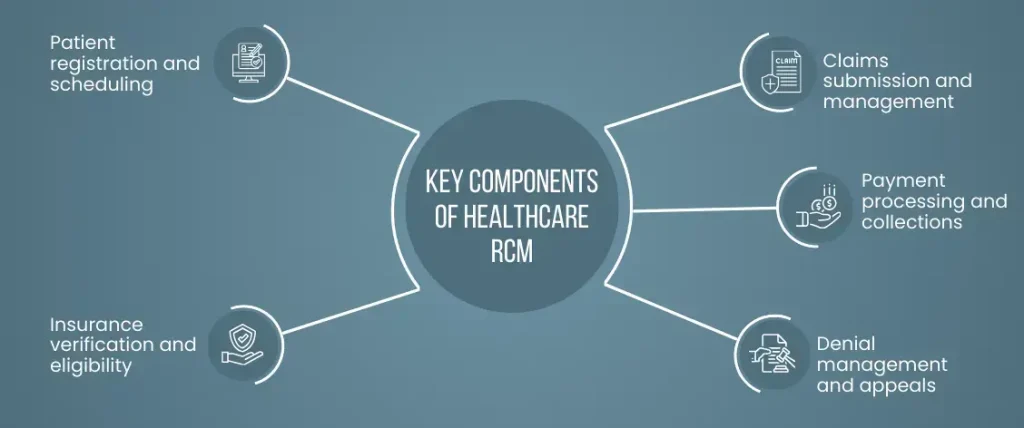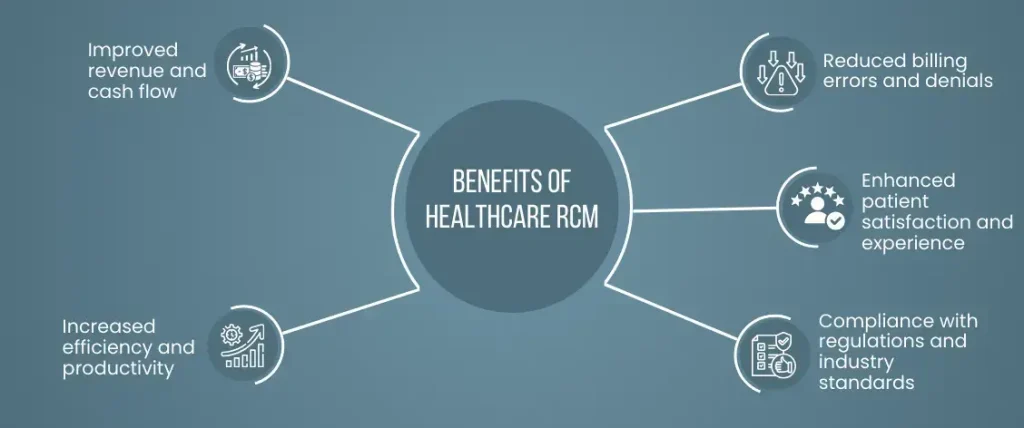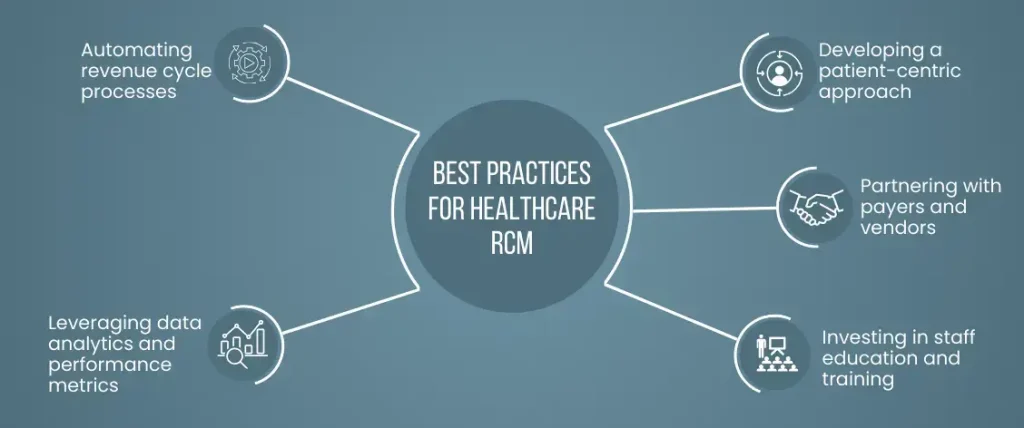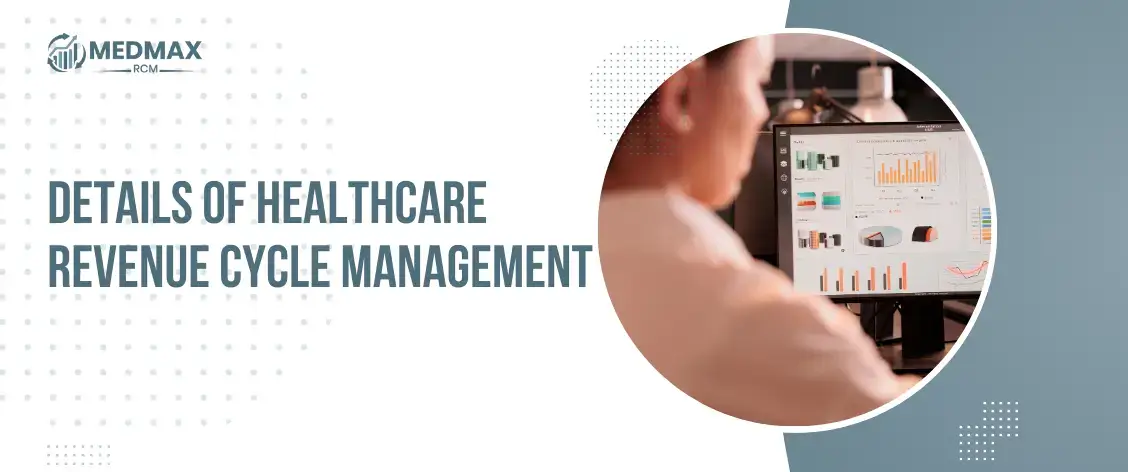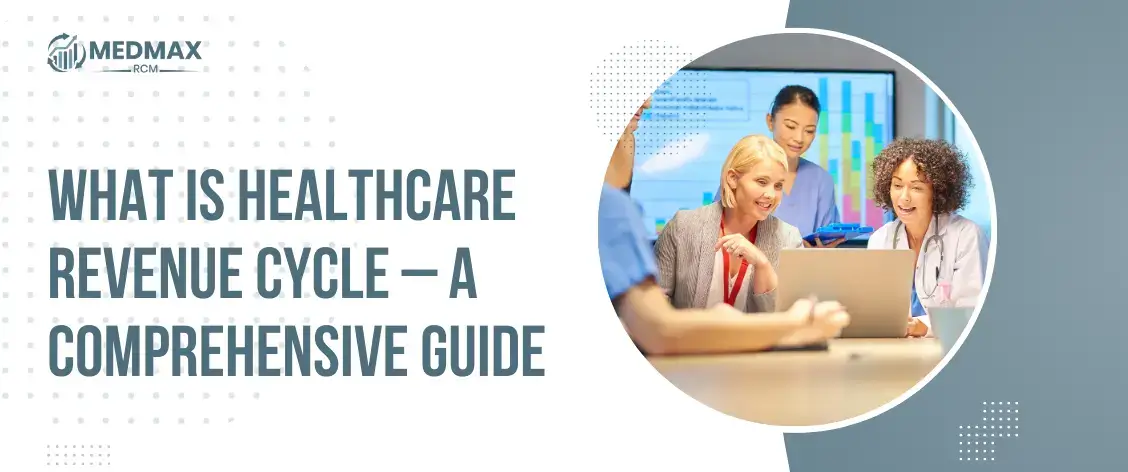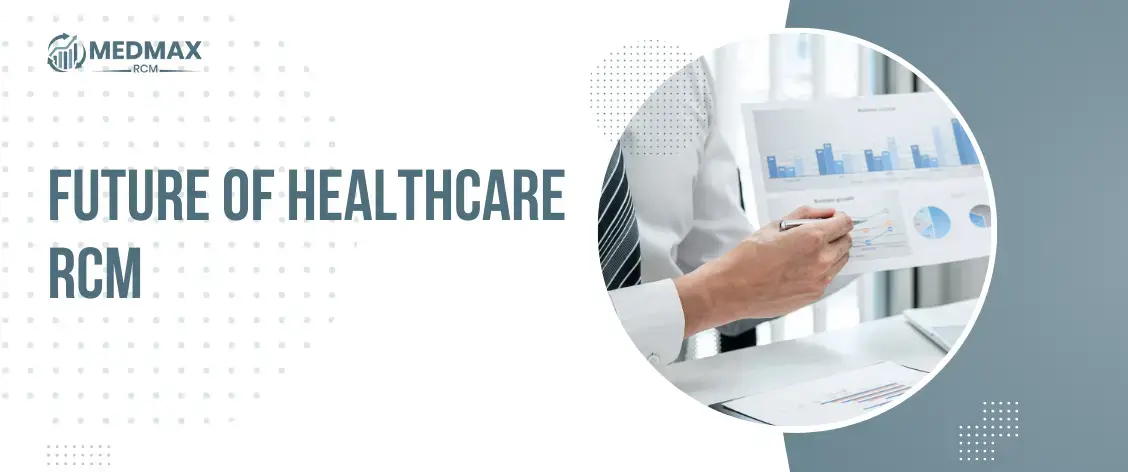
Future of Healthcare RCM
Table of Contents
ToggleWhat is Healthcare RCM?
Healthcare RCM is the process of managing the financial aspects of a patient’s journey through the healthcare system, from appointment scheduling and registration to claims submission and payment collection. It involves a series of steps that help healthcare providers optimize their revenue and cash flow.
Why is Healthcare RCM important?
Effective Healthcare RCM is critical to the financial health of healthcare organizations. It helps them maximize revenue, reduce administrative costs, and improve patient satisfaction. Without effective RCM, healthcare providers risk losing revenue due to claim denials, underpayments, and other billing errors.
Who uses Healthcare RCM?
Healthcare RCM is used by a wide range of stakeholders, including healthcare providers, payers, and patients. Providers use RCM to manage their revenue and cash flow, while payers use it to manage claims processing and reimbursements. Patients benefit from RCM through improved billing transparency and accuracy.
Key Components of Healthcare RCM
Patient registration and scheduling
The first step in the Healthcare RCM process is patient registration and scheduling. This involves collecting patient demographic and insurance information, verifying eligibility, and scheduling appointments.
Insurance verification and eligibility
After patient registration, the next step is insurance verification and eligibility. Providers must verify patients’ insurance coverage to ensure that claims will be paid. This step involves checking for active coverage, verifying policy details, and obtaining authorization for services.
Claims submission and management
Once patients receive care, providers must submit claims to payers for reimbursement. Claims management involves ensuring that claims are accurate, complete, and timely. It also includes managing claim denials, appeals, and resubmissions.
Payment processing and collections
After claims are submitted and processed, the next step is payment processing and collections. Providers must bill patients for any remaining balances not covered by insurance. This step involves managing patient statements, collections, and payment processing.
Denial management and appeals
Denials and underpayments are common in the healthcare billing process. Denial management involves identifying the reasons for denials, appealing denied claims, and resubmitting claims. Effective denial management can help healthcare providers maximize their revenue and minimize administrative costs.
Benefits of Healthcare RCM
Improved revenue and cash flow
Effective Healthcare RCM can help healthcare providers optimize their revenue and cash flow. By improving billing accuracy, reducing claim denials, and increasing reimbursements, providers can increase their bottom line.
Increased efficiency and productivity
Streamlining RCM processes can also improve efficiency and productivity. By automating billing processes, reducing administrative tasks, and increasing staff productivity, providers plus provider credentialing can save time and reduce costs.
Reduced billing errors and denials
Effective Healthcare RCM can also reduce billing errors and denials. By ensuring that claims are accurate, complete, and timely, providers can reduce the likelihood of denials and underpayments.
Enhanced patient satisfaction and experience
Improved RCM processes can also lead to enhanced patient satisfaction and experience. By improving billing transparency, reducing billing errors, and increasing patient education, providers can increase patient satisfaction and trust.
Compliance with regulations and industry standards
Effective Healthcare RCM can also help healthcare providers comply with regulations and industry standards. By adhering to billing and coding guidelines, staying up-to-date on changes in regulations, and ensuring data security, providers can reduce compliance risks and avoid penalties.
Challenges in Healthcare RCM
Complexity of healthcare billing and coding
One of the biggest challenges in Healthcare RCM is the complexity of healthcare billing and coding. The healthcare industry uses a variety of codes and regulations, which can be difficult to navigate. This complexity can lead to billing errors, claim denials, and compliance risks.
Fragmented healthcare systems and workflows
The fragmentation of healthcare systems and workflows can also pose a challenge to Healthcare RCM. Healthcare providers often have to work with multiple payers, vendors, and systems, which can make it difficult to streamline billing processes and ensure data accuracy.
Staffing and training issues
Effective Healthcare RCM requires well-trained staff who can navigate the complexities of healthcare billing and coding. However, staffing and training can be a challenge for healthcare providers, who often struggle to attract and retain qualified personnel.
Changes in regulations and payer policies
Regulations and payer policies are constantly changing, which can make it difficult for healthcare providers to keep up-to-date with billing guidelines and requirements. This can lead to compliance risks and billing errors.
Technological limitations and security concerns
Healthcare providers must also contend with technological limitations and security concerns when it comes to Healthcare RCM. Legacy systems, data silos, and cybersecurity risks can all pose challenges to effective RCM.
Best Practices for Healthcare RCM
Automating revenue cycle processes
One of the best practices for Healthcare RCM is to automate revenue cycle processes. By using software and tools to streamline billing processes, providers can reduce administrative tasks, improve accuracy, and increase efficiency.
Leveraging data analytics and performance metrics
Healthcare providers can also benefit from leveraging data analytics and performance metrics to track RCM performance. By analyzing key performance indicators (KPIs), providers can identify areas for improvement and make data-driven decisions.
Developing a patient-centric approach
Developing a patient-centric approach to Healthcare RCM is another best practice. By improving patient education, communication, and billing transparency, providers can enhance patient satisfaction and trust.
Partnering with payers and vendors
Collaboration with payers and vendors can also be beneficial for Healthcare RCM. By working closely with payers to streamline claims processing, negotiate reimbursement rates, and manage denials, providers can improve their revenue cycle performance.
Investing in staff education and training
Finally, investing in staff education and training is a critical best practice for effective Healthcare RCM. By ensuring that staff members are trained on the latest billing and coding guidelines, regulations, and technologies, providers can reduce errors, improve efficiency, and optimize their revenue cycle.
Wrap Up!
Healthcare RCM is a critical component of healthcare organizations that ensures financial stability and operational efficiency. Effective Healthcare RCM requires a deep understanding of complex billing processes, compliance guidelines, and evolving regulations. Outsourcing your Healthcare RCM to a trusted provider like Medmax can be a smart choice for healthcare organizations. Medmax has extensive expertise in navigating the complexities of healthcare billing and coding, ensuring compliance, and optimizing revenue cycle performance.
By outsourcing your RCM to Medmax, you can free up your internal resources, reduce administrative tasks, and enhance your financial stability and operational efficiency. With a commitment to delivering high-quality services and leveraging cutting-edge technologies, Medmax can help your organization achieve its revenue cycle goals and focus on providing excellent patient care.

Related Posts
Emily Thompson
Emily Thompson is a Revenue Cycle Management (RCM) Specialist with extensive experience in the medical billing industry. She helps healthcare organizations and medical billing companies improve claim efficiency, reduce A/R backlogs, and implement data-driven RCM strategies. Emily’s articles focus on end-to-end medical billing services, denial prevention, and technology-driven revenue optimization for healthcare practices across the U.S.


